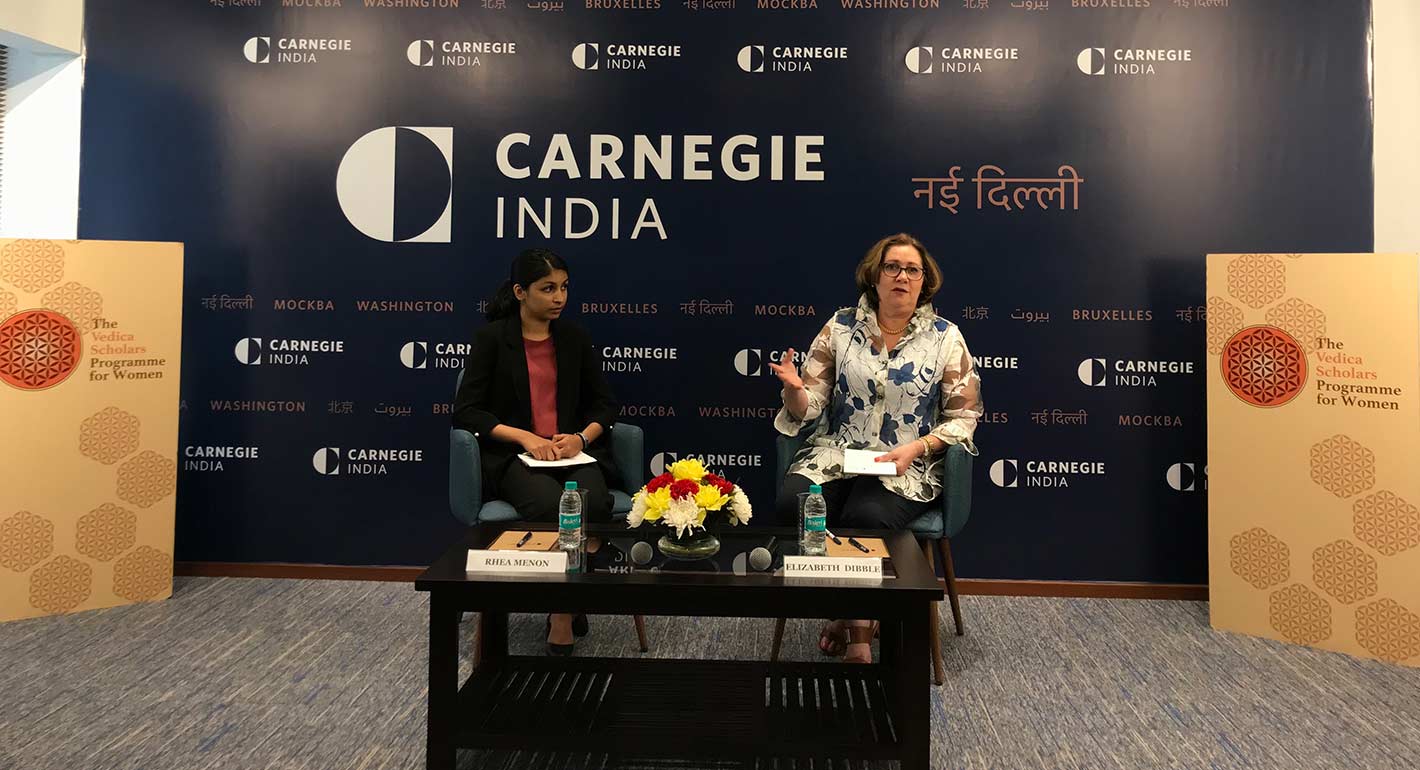Registration
You will receive an email confirming your registration.
The Anahita Speaker Series, an initiative by Carnegie India and the Vedica Scholars Programme for Women, is a monthly women’s speaker series that aims to highlight the experiences and achievements of women professionals who are giants in their fields.
Diplomatic missions play a critical role in advancing a nation’s interests and developing inter-state relations. The construction and maintenance of a nation’s diplomatic relations is both, an invaluable and difficult undertaking. Diplomats face the formidable task of being their nation’s representatives in tackling a variety of security, economic, and cultural issues.
Elizabeth Dibble, chief operating officer of the Carnegie Endowment for International Peace, inaugurated the Anahita Speaker Series with a discussion on the intricate landscape of diplomacy, drawing from her thirty-six-year career as one of America’s foremost diplomats. The discussion was moderated by Rhea Menon, a research assistant at Carnegie India.
DISCUSSION HIGHLIGHTS:
- A Changing World Order: Participants discussed how diplomacy has evolved since the Cold War era. They stated that the global order has transformed from a unipolar world to a bipolar contest between the USSR and the United States, and ultimately to a multipolar system. Participants noted that the 9/11 attacks, the rise of China as a global power, and the emergence of India and Brazil as regional and economic powers have contributed to the global flux. Further, participants expressed concern over the increasing involvement of non-state actors in disrupting the global order.
- Makings of a Diplomat: Participants stated that diplomacy is the first tool that is deployed when any nation is confronted by a challenge. They noted that, while understanding foreign societies is necessary, it is imperative to remember that diplomats represent the values and policies of the country they serve. They asserted that qualities, such as the ability to work in a complex international landscape, a nuanced grasp of history and culture, proficiency in foreign languages, and an understanding of the world of diplomacy and negotiations are critical to a diplomat’s success. The participants also stated the need for diplomats to be patient enough to cultivate long-standing relations with other countries. In today’s world of instantaneous news, they noted, the ability to learn and adapt to situations quickly is crucial to be a successful diplomat. Finally, participants highlighted the importance of diplomats being nonpartisan while working in government to effectively work with various administrations.
- New Models of Leadership: The participants acknowledged that, in addition to a changing global landscape, the world is witnessing the emergence of strong man politics. This phenomenon is present across much of the world, from states in North America, to Europe and, to Asia. The participants noted that irrespective of geographic diversity, most of these politicians favor an aggressive brand of politics and often indulge in mutual admiration. As a contrast to this phenomenon, the participants cited the example of New Zealand Prime Minister, Jacinda Arden’s empathetic and effective response to the recent terrorist attacks in the country. Participants emphasized the importance of quick thinking and maintaining integrity in the face of crises as a model for good leadership.
- Overcoming Barriers: Drawing from their experiences, participants noted the physical and psychological barriers that women are often faced with, especially when entrusted with positions of power. They highlighted the importance of encouraging and supporting other women in the workplace. In an increasingly competitive world, young individuals need to be wary of the imposter syndrome and should instead focus on excelling at their own pace, they noted.
This event summary was prepared by Nikhila Eda and Upasana Sharma, research interns at Carnegie India.

